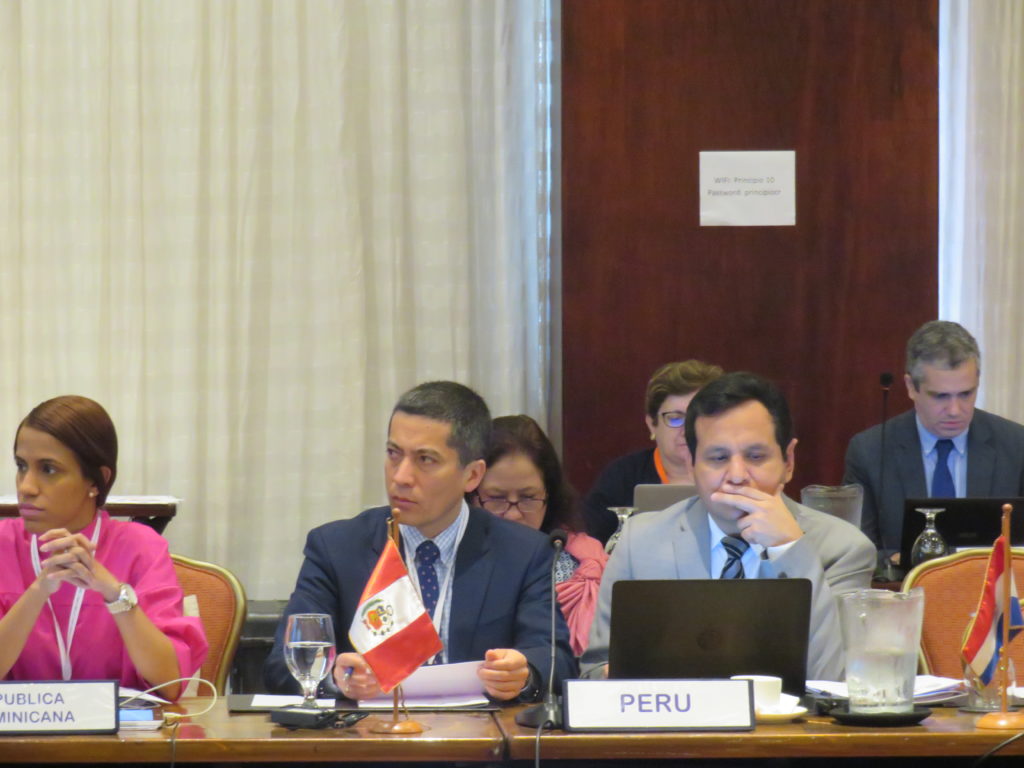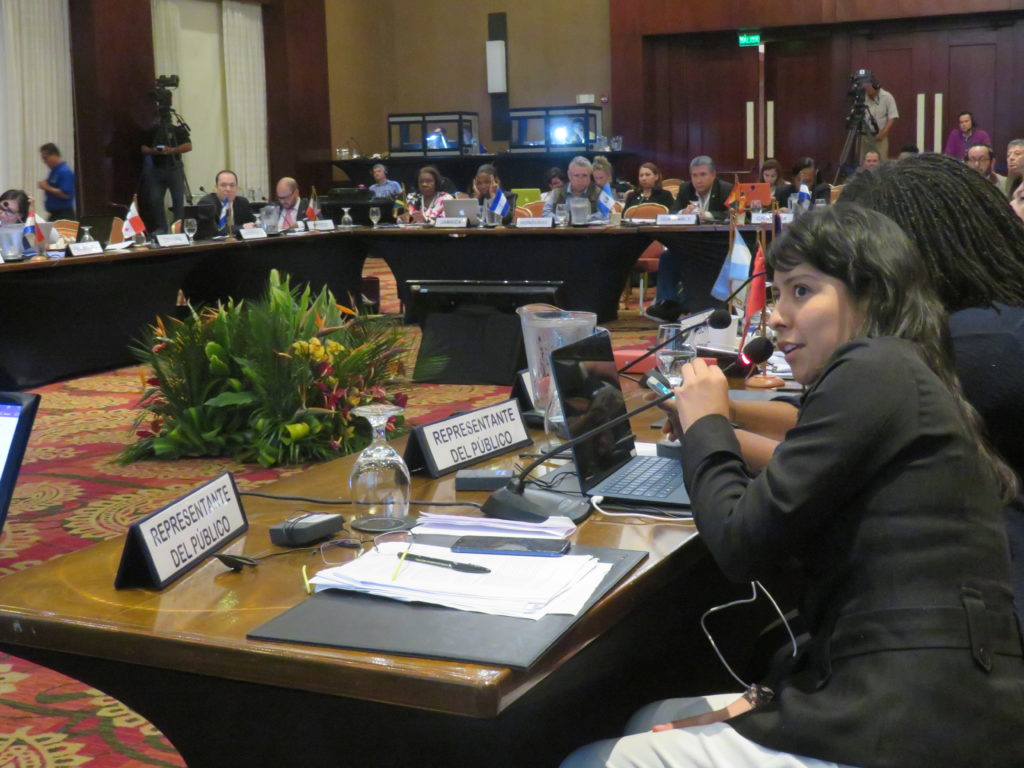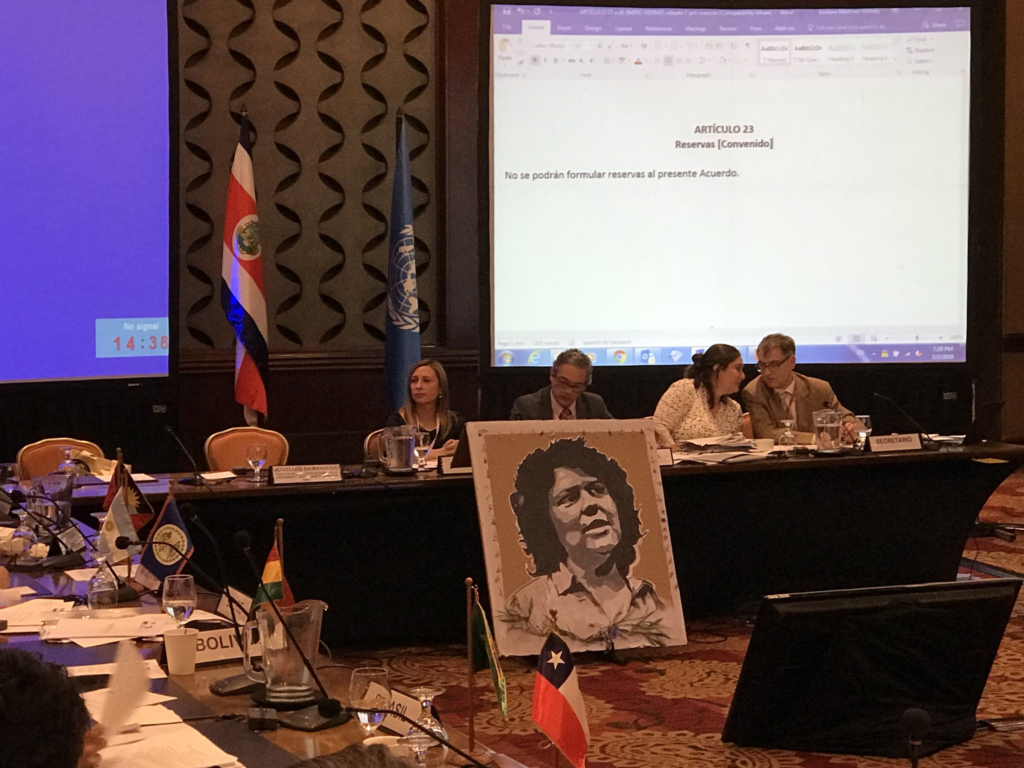Binding Regional Agreement with no reservations to protect environmental defenders, access to information and environmental participation!
#DARenelP10 #Principle10 #DemocraciaAmbiental
More than 4 years after the negotiations started, the objective was accomplished. We now have an agreement which includes specific commitments regarding environmental defenders from all over the continent.
 DAR has been involved in the process since 2015 as members of the Public Mecachanims –and more recently as members of The Acces Initiave– supporting the advocacy and communications strategy. Since then we have been working together with organizations such as Cemda and Cultura Ecológica from México, Farn from Argentina, Article 19 from Brazil, Ambiente y Sociedad from Colombia, and the Representatives from the Public Andrea Sanhuenza, Carol Excell, Tomás Severino, Natalia Gómez and Karetta Crooks. The objective was to include to raise the standard in the implementation of environmental rights. After intense negotiations, with articles getting in and out from the Agreement, we believe that the result is positive and provides us with a clean path to keep advocating for the full implementation, with clear politics and legislation towards environmental justice in the region.
DAR has been involved in the process since 2015 as members of the Public Mecachanims –and more recently as members of The Acces Initiave– supporting the advocacy and communications strategy. Since then we have been working together with organizations such as Cemda and Cultura Ecológica from México, Farn from Argentina, Article 19 from Brazil, Ambiente y Sociedad from Colombia, and the Representatives from the Public Andrea Sanhuenza, Carol Excell, Tomás Severino, Natalia Gómez and Karetta Crooks. The objective was to include to raise the standard in the implementation of environmental rights. After intense negotiations, with articles getting in and out from the Agreement, we believe that the result is positive and provides us with a clean path to keep advocating for the full implementation, with clear politics and legislation towards environmental justice in the region.
Principle 10 in Peru
 In the Words of Fernando León, Vice Minister of Natural Resources Strategic Development “This Agreement complements just fine all the steps forward the Peruvian government have made regarding access to information, citizen participation and environmental justice; while also achieving a regional vision in this matters […] The Agreement strengthens our Environmental Management National System (SNGA, in Spanish), the Environmental Impact Assessment National System and the Environmental Enforcement National System, since all of these have citizen participation as a cornerstone. In the same way, the Judicial Branch as part of the SNGA will find a support in the Agreement to keep strengthening actions like the creation of our first specialized court on environmental crimes, and the consolidation of the Madre de Dios Pact.”
In the Words of Fernando León, Vice Minister of Natural Resources Strategic Development “This Agreement complements just fine all the steps forward the Peruvian government have made regarding access to information, citizen participation and environmental justice; while also achieving a regional vision in this matters […] The Agreement strengthens our Environmental Management National System (SNGA, in Spanish), the Environmental Impact Assessment National System and the Environmental Enforcement National System, since all of these have citizen participation as a cornerstone. In the same way, the Judicial Branch as part of the SNGA will find a support in the Agreement to keep strengthening actions like the creation of our first specialized court on environmental crimes, and the consolidation of the Madre de Dios Pact.”
What was discussed?
Articles from 13 to 15 were discussed in this round of negotiations. Definitions, preamble, principles among others were the main topics. Among the most important achievements of civil society we have the inclusion of definitions for individuals and groups in situation of vulnerability, environmental defenders, environmental information and the elimination of the possibility for parties to make reservations.
For Aida Gamboa, DAR’s specialist and part of the negotiation process “This Agreement is important to generate a standard in Latin America and the Caribbean in a current context of corruption and impacts generated for extractive and infrastructure projects. Specially in those countries where there is no effective national instruments to guarantee these rights, instruments recommended by multilateral institutions like the Inter-American Commission on Human Rights and the United Nations. Furthermore, it strengthens the steps forward Peru have taken to protect vulnerable peoples, environmental defenders, considering that this will also impact in the consolidations of other rights like prior consultancy, to health, a clean and healthy environment and to territory”.
Some of the setbacks were the definitions of “public”, the elimination of the possibility to send communications to the Facilitation Committee of the Agreement and that the reference to “broad, active legitimacy” gets subordinated to the national legislation in the definition of “Environmental Justice”.
Without the participation of the public, the agreement wouldn´t be the same we have now. One with no reservations from any party and waiting for 11 ratifications to come into force. We hope that both, ratification and implementation happen soon.
One minute of silence for Berta
The negotiation meeting come to an end with a hearty tribute to Berta Cáceres, exactly two years after her tragic death. Civil society members asked for a minute of silence in the room. The act helped government officials to remember the importance of achieving the total implementation of the Agreement, and the consequences of the progressive weakening of environmental regulations and proper protection have brought for those who are in the first line of defense when social conflicts happen regarding the use of our natural resources.



